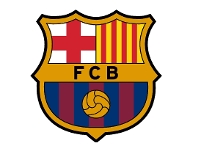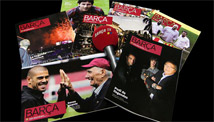Main menu

Content menu
Club
07.09.2010 10:30
Ethical code of FC Barcelona
www.fcbarcelona.cat
Shortly we will be announcing the new ethics code of FC Barcelona.
Futbol Club Barcelona is a private Catalan sports association made up of physical persons, and
which is non-profit making and which features in the Generalitat de Catalunya Register of sports
entities.
The proper management of a sporting institution requires the establishment of mechanisms to
not only ensure that the objectives of its main activity are met, but also that the system used is
fully respectful of good business practices.
Moreover, in particular reference to Futbol Club Barcelona, whose history and trajectory is
of worldwide relevance as well as being firmly rooted in Catalan society, the way that its top
management administrates and represents the club must respect certain ethical values that are in
keeping with the social nature and principles that inspired it. Futbol Club Barcelona is
“more than a club” and society expects its directors and managers to reflect the values
that it represents.
Hence the need to create an Ethical Code (or code of good governance) to regulate, in
material terms, the values that should inspire, in positive terms, proper governance and
representation of the club and that outlines, in negative terms, the conducts that contradict these
values. Bearing in mind the complex caustics of the present situation, a Control and Transparency
Commission has been created to effectively define and interpret the application of the Ethical Code
in consideration of pertinent and opportune criteria, and where necessary to advise which actions
of governance and administration are opposed to these values.
II.- SUBJECTIVE SCOPE
The Ethical Code must be applied to all people that corporately represent the club, i.e. the
members of the Board of Directors and the Commissions (Economic, Disciplinary, Juridical, Social
and Sports), plus all other staff working in Top Management.
III.- MATERIAL SCOPE
1.- All persons that assume responsibility for the Club must adjust their
managerial style to and make decisions that strictly comply with the pertinent and opportune
values.
2.- The intention must always be to achieve the main objectives of the
Club’s activity (sporting success and the economic sustainability of the resources used),
while always employing practises and behaviours that dignify the Club, its image and the values
that it represents.
3.- In applying the aforementioned criteria the actions of the directors and
executive must be adjusted to the following principles
3.1.-
Legality: The actions of the Club representatives must observe what is established
in the laws and regulations of the domestic and international organisations that defend and promote
sport.
3.2-
Honour and Service for members: The Club’s representatives must always act
as the managers of assets that belong to the members. Therefore, they must manage the club honestly
and efficiently and always in defence of the Club’s interests.
3.3.-
Loyalty to the Club: Any action by a Club representative, either managerial or
representative, must only and exclusively pursue the Club’s own interests. This loyalty is
compatible with any discrepancy regarding the opinions among the Board of Directors and the
Club’s other governing bodies, but the Club’s representatives must avoid, under all
circumstances, the dissemination of news that could damage the good name and good image of the
Club.
3.4.-
Communication: The Club’s attitude will always be to provide extensive
information on its activities, based on the transparency of its decision making processes.
3.5.-
Participation: The Club will promote the greater participation of its members, by
means of the Assembly, in decision making, in accordance with the nature of any given matter.
3.6.- Pluralism: The Club, in keeping with its history and Catalanness, and given
the diversity of the ideas of its members, directors, players and employees, will preserve and
respect pluralism, and will always strive to avoid any Club policies or actions that are of an
exclusive nature.
3.7.- Austerity: Austerity, as a value of reference, will govern at all times the
way the Club is managed and will be applied to all of the Club’s social and economic
activities.
4.- The following practices are considered contrary to the aforementioned principles and
values.
4.1.- Incurring in conflicts of interests, and if any should arise, the affected
party should make them known and abstain from any involvement in the decision making process.
4.2.- Exerting influence over others in order for a decision to be made to
one’s own benefit.
4.3.- The directors and members of commissions may not intervene in any area of
management that is different to that which has been assigned to them without previously having
received express authorisation for the party responsible.
4.4.- Contracting labour or trade with relatives up to four times removed, whether
personally or through companies in which they have a stake or for which they work.
4.5.- Contracting of external services without this being adjusted to the
principles of need, pertinence and opportunity.
4.6.- Acceptance of free gifts, presents, advantages or dispositions any further
than those that could be used for club purposes. Neither may gifts be offered to third parties that
have not been institutionally authorised.
4.7.- Incurring the Club in disproportional, sumptuous or unjustified expenses.
4.8.- Perception of commissions or any paid compensation.
4.9.- Payment of commissions that exceed or are marginal to those corresponding to
authorised professionals.
4.10.- Exploitation of one’s position in the club to obtain personal or
professional benefits when said benefits could involve damage to the Club.
4.11.- Failure to respect the confidentiality standards of the deliberations
involved in decision making processes.
4.12.- Appearance in public, or even private, events that are contrary to the good
image and prestige of Futbol Club Barcelona.
4.13.- Use of the Club’s goods and assets for one’s own benefit.
4.14.- Discrimination or improper treatment for reasons of gender, race, colour,
nationality, belief, religion, political opinion, state, sexual orientation, disability or any
other personal circumstance protected by law, with respect to all employees, directors, members or
suppliers.
5.- The Ethical Code does not only require commitment to what is expressly
contained within the same but also all consequences that are in good faith derived from that
content.
6.- If the Club considers it pertinent and opportune for any decision to be made
that does not observe the practices defined in the previous section, a written report shall be
required previously and perceptively by the Control and Transparency Commission. Once this report
has been issued, the Club’s Board of Directors will adopt the decision it feels to be the
most appropriate.
IV.- FORMAL SCOPE
In order to control compliance with the material content of the Ethical Code, a Control and
Transparency Commission is set up with the power to interpret, assess and advise the Board of
Directors and the Members’ Ombudsman regarding conduct that does not respect the same.
This will be formed by 5 members designated by the Board of Directors for a period of six
years to coincide with the mandate of the Board of Directors itself.
Its duties are those that enable it to undertake its work. These include:
- Issue of reports on the questions that the Board of Directors presents for
assessment or judgement or that require a prior and favourable report.
- Acceptance or rejection on good motive of any complaints that are formulated by
the Board of Directors, by a member of the same or by the commissions ascribed to the Board of
Directors, by the Ombudsman or by any employee with respect to actions carried out or decisions
made and to issue a report on the question that was the subject of the complaint, advising, if
necessary, of the behaviours that are not in keeping with the material content of the Ethical Code.
- Obtainment of information for the issue of said reports.
- Reporting to the General Assembly on the actions carried out during the period.
- Promotion of modifications to the Ethical Code, which in all cases must be
approved by the Club’s General Assembly.
This Commission’s actions must be guaranteed in full respect of the principles of the
independence of its members and the confidentiality of its deliberations.


